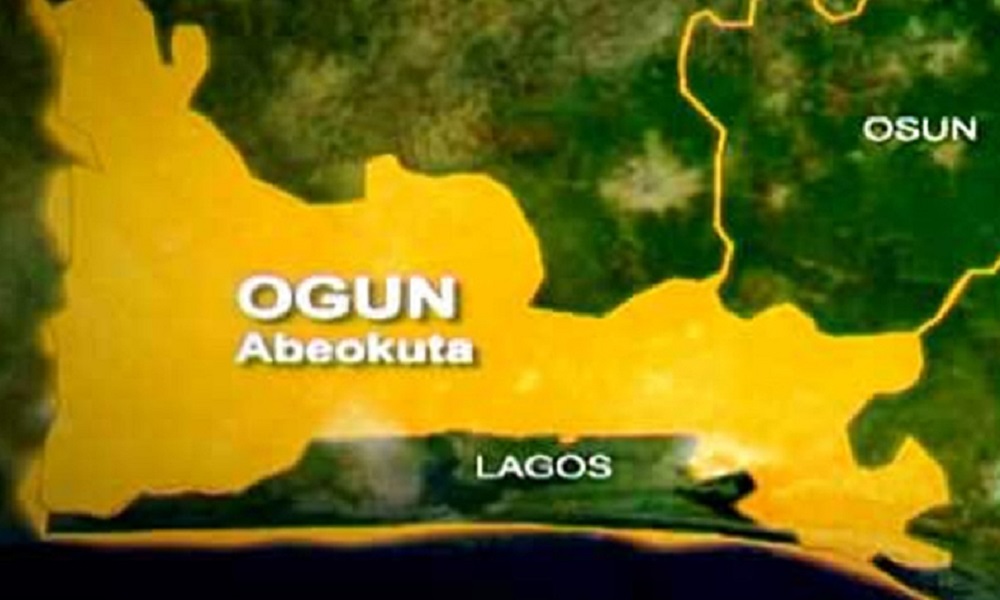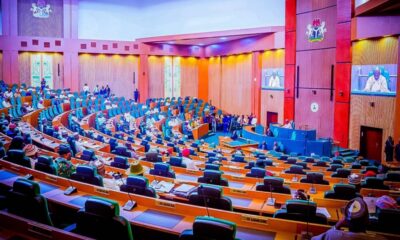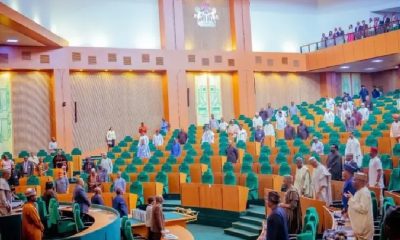News
Senate vows to end illegal mining in Nigeria

By Francesca Hangeior
As part of its commitment to establish a safer and more profitable mining sector, the Nigerian Senate has vowed to eliminate illegal mining activities that have been depriving the federal government of significant revenue and contributing to food and physical insecurity across the country.
Chairman of the Senate Committee on Solid Minerals, Senator Ekong led a delegation to Niger State to investigate the recent collapse of a mining pit that claimed around 30 lives over the weekend.
During the visit, Ekong emphasized that illegal and unregulated mining operations are major obstacles to realizing the multi-billion-dollar potential of Nigeria’s minerals sector, with unauthorized miners using unsafe and environmentally harmful practices.
“The illegal mining practices, using crude methods and little regard for safety, continue to undermine our mining sector’s potential and threaten environmental and public health,” Ekong stated. “The Senate remains committed to creating legislative solutions to support the growth and safety of Nigeria’s mining industry.”
In response to the committee’s visit, Governor Mohammed Umaru Bago of Niger State expressed the state’s readiness to work with the National Assembly to enact laws that would reform the mining sector, benefiting all stakeholders—including the federal and state governments, local communities, and miners.
Bago described “Responsible Mining” as a new initiative, inspired by models seen in Brazil, that would require companies to provide community support, such as potable water, healthcare, and education, to offset the impacts of mining.
Ekong used the occasion to convey condolences to the people of Niger State for the tragic June 3, 2024, mining site collapse in Shiroro, which caused significant fatalities and displaced many families. Ekong praised the Niger State Government and the Federal Ministry of Solid Minerals for their swift response to the disaster and urged for further assistance to the affected families.
“Mining incidents like the one in Shiroro are far too common, and the sector loses substantial revenue daily due to unauthorized, black-market-style mining that has also fueled insecurity,” Ekong said. “We must collaborate to address these challenges and protect our national resources.”
He highlighted the economic potential of Nigeria’s solid minerals sector, noting that curbing illegal mining could generate substantial revenue, diversify the economy, and boost Nigeria’s GDP.
Governor Bago assured the Senate of Niger State’s commitment to advancing responsible mining practices. “Artisanal mining has led to loss of lives and property and has fueled insecurity. With a responsible mining bill, we can ensure mining activities are sustainable and beneficial for communities,” he said.
The Senate delegation included Senators Diket Plang, Amos Yohanna, Professor Anthony Ani, Okechukwu Ezea, and Sani Musa, who initially brought the Shiroro tragedy to the Senate’s attention. The committee intends to continue working closely with local and federal stakeholders to create a safe, sustainable mining industry that benefits the Nigerian economy and protects the lives of all involved.
News
Your Best Days in Politics Are Still Ahead – Speaker Abbas Tells Kalu

By Gloria Ikibah
Speaker of the House of Representatives, Rep. Tajudeen Abbas, has hailed his Deputy, Rep. Benjamin Okezie Kalu, as a rising force in Nigeria’s political landscape, describing him as a man whose journey is only just beginning.
Abbas gave the remarks on Tuesday inside the chamber, shortly after plenary, as members of the House gathered to celebrate Kalu’s 54th birthday with a brief ceremony and a cake-cutting session.
Kalu, who represents Bende Federal Constituency of Abia State, turned 54 on Monday.
A lawyer by training and former spokesperson for the House, he has grown into a familiar face not just within Nigeria’s legislature but also across international parliamentary networks.
In recent times, Kalu has taken on significant continental and global responsibilities. He chairs the Finance and Administrative Committee of the ECOWAS Parliament and leads the African Union Parliament’s Committee on Monetary and Financial Affairs. He is also an active member of the Inter-Parliamentary Union and sits on the steering committee of the Parliamentary Conference on the World Trade Organization.
His colleagues describe him as strategic, forward-looking, and quietly ambitious, a lawmaker whose blend of eloquence and diplomacy has made him a respected voice both at home and abroad.
Speaking to journalists after the brief celebration, Abbas said, “Benjamin Kalu is not just a Deputy Speaker. He is a man with vision, poise, and the kind of political maturity that Nigeria will need even more in the years to come. His future is very bright.
News
Council poll: APC working on consensus candidates ahead of primaries

Lagos State chapter of the All Progressives Congress (APC) is working towards consensus candidates for the upcoming primary election scheduled for Saturday.
The move is part of the party’s efforts to maintain unity and reduce internal frictions.
Five aspirants emerged unopposed following the screening organised by the party.
The incumbent Chairman of Surulere Local Government, Sulaimon Yusuf; his counterpart in Iba Local Council Development Area (LCDA), Jubril Yisa; Motunrayo Alogba of Ijede LCDA and Kasali Bamidele in Lekki LCDA emerged unopposed. A new aspirant, Azeez Kareem, was the only person cleared to contest in Oto-Awori LCDA.
Chairman of the APC Lagos State Electoral Committee, Babatunde Ogala, SAN, in an interview with The Nation, disclosed that more aspirants had emerged unopposed following interventions from the party leaders.
He expressed optimism that many more aspirants would step down before the Saturday primary election.
“We are hoping to have at least 70 per cent consensus candidates going into the primary election. If we can achieve that, it will leave us with only 30 per cent to conduct primaries for,” he said.
According to him, the appeal committee, headed by Mr. Adeniji Kazeem, SAN, has been sitting for the past two days and has received over 100 petitions.
Ogala said the committee had treated over 70 of the petitions and would conclude their assignment today (Wednesday).
He explained that while the party had prepared for indirect primaries, involving delegates drawn from local government executives, efforts were ongoing at various levels to arrive at consensus candidacies in many wards.
He said electoral materials were being finalised for distribution by Saturday, with electoral officers already appointed to oversee the process in all 57 local councils.
Ogala said security had been fully arranged in collaboration with the police, DSS, civil defence and Lagos traffic officials to ensure order and smooth movement at the secretariats where the primaries were expected to take place.
According to him, the party is also scheduled to hold a key stakeholders’ meeting today with senior officials and aspirants to finalise agreements and chart the way forward.
News
$400m steel factory set to begin operations in Ogun

President of Inner Galaxy Group, Mr. Li Shuang, yesterday, disclosed that his company was ready to set up a $400 million hot rolled coiled steel factory with the capacity to employ about 6,500 direct and indirect workers in Ewekoro Local Government Area of Ogun State.
He made this known while leading a delegation of principal officials of the organization at the Governor’s Office located at Oke-Mosan, Abeokuta.
He added that the company is expected to commence operations in April 2026, saying the organization, a multinational company with vast investments in Asia, the Philippines, Malaysia, and some African countries like Ghana and Angola, entered the Nigerian market in 2005, producing iron rods for the building industry.
Governor Dapo Abiodun expressed delight in the huge investment, as he ascribed the success to his administration’s deliberate and intentional move to make the state the leading industrial hub in Nigeria and the West Africa sub-region.
“This is a $400 million investment; this aligns with the President’s vision to ensure that we grow this economy to a trillion dollars, and I think that you will be contributing your quota in achieving that. We are excited that you will also be employing people.
“I will be commissioning a multimillion-dollar diagnostic equipment facility during the week. This administration has managed to attract quite a lot of industries in the last six years,”
Abiodun noted that the state is blessed with abundant human and natural resources, adding that alluvial gold had been discovered in large quantities, just as the state has the highest quality of lithium.
-

 Opinion18 hours ago
Opinion18 hours agoRIVERS, WIKE, FUBARA, AND THE WAY FORWARD
-

 Politics17 hours ago
Politics17 hours agoJust in: Delta PDP Reps members defect to APC
-

 News22 hours ago
News22 hours agoVDM may be released on Tuesday
-

 News19 hours ago
News19 hours agoNANS Barricades Lagos-Ibadan Expressway Over Alleged NELFUND Mismanagement
-

 News15 hours ago
News15 hours agoTension As Lawmakers Warns of Public Revolt Over Insecurity
-

 News19 hours ago
News19 hours agoCourt bans Nnamdi Kanu’s in-law from 3 proceedings over live streaming
-

 News14 hours ago
News14 hours agoEdo Speaker, Two Other Lawmakers, Formally Join APC
-

 News15 hours ago
News15 hours agoRep Raises Alarm After Deadly Attacks In Borno, Says Boko Haram Is Returning Stronger





